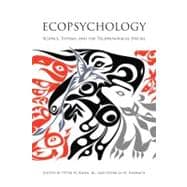
Note: Supplemental materials are not guaranteed with Rental or Used book purchases.
Purchase Benefits
Looking to rent a book? Rent Ecopsychology Science, Totems, and the Technological Species [ISBN: 9780262517782] for the semester, quarter, and short term or search our site for other textbooks by Kahn, Peter H.; Hasbach, Patricia H.. Renting a textbook can save you up to 90% from the cost of buying.
| Acknowledgments | p. vii |
| About the Contributors | p. ix |
| Introduction to Ecopsychology: Science, Totems, and the Technological Species | p. 1 |
| The Topophilia Hypothesis: Ecopsychology Meets Evolutionary Psychology | p. 23 |
| A Nature Language | p. 55 |
| What Is Ecopsychology? A Radical View | p. 79 |
| Ecotherapy | p. 115 |
| Building the Science Base: Ecopsychology Meets Clinical Epidemiology | p. 141 |
| Ecovillages: Information Tools and Deeply Sustainable Living | p. 173 |
| Can Architecture Become Second Nature? An Emotion-Based Approach to Nature-Oriented Architecture | p. 195 |
| Psychological Discontent: Self and Science on Our Symbiotic Planet | p. 219 |
| Psychoterratic Conditions in a Scientific and Technological World | p. 241 |
| Beauty and the Brain | p. 265 |
| Sacred Geography | p. 285 |
| Afterword | p. 309 |
| Name Index | p. 323 |
| Subject Index | p. 335 |
| Table of Contents provided by Ingram. All Rights Reserved. |
The New copy of this book will include any supplemental materials advertised. Please check the title of the book to determine if it should include any access cards, study guides, lab manuals, CDs, etc.
The Used, Rental and eBook copies of this book are not guaranteed to include any supplemental materials. Typically, only the book itself is included. This is true even if the title states it includes any access cards, study guides, lab manuals, CDs, etc.